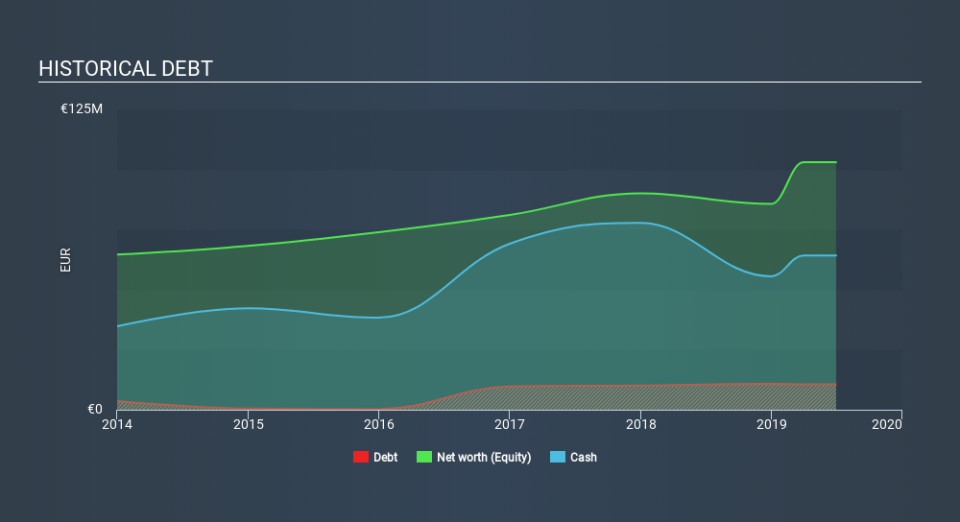Is Frequentis (ETR:FQT) Using Too Much Debt?

David Iben put it well when he said, 'Volatility is not a risk we care about. What we care about is avoiding the permanent loss of capital. So it might be obvious that you need to consider debt, when you think about how risky any given stock is, because too much debt can sink a company. We can see that Frequentis AG (ETR:FQT) does use debt in its business. But the more important question is: how much risk is that debt creating?
Why Does Debt Bring Risk?
Debt assists a business until the business has trouble paying it off, either with new capital or with free cash flow. Part and parcel of capitalism is the process of 'creative destruction' where failed businesses are mercilessly liquidated by their bankers. However, a more usual (but still expensive) situation is where a company must dilute shareholders at a cheap share price simply to get debt under control. Of course, the upside of debt is that it often represents cheap capital, especially when it replaces dilution in a company with the ability to reinvest at high rates of return. When we examine debt levels, we first consider both cash and debt levels, together.
See our latest analysis for Frequentis
What Is Frequentis's Debt?
The image below, which you can click on for greater detail, shows that at June 2019 Frequentis had debt of €10.6m, up from €10.1 in one year. However, it does have €64.2m in cash offsetting this, leading to net cash of €53.6m.
How Strong Is Frequentis's Balance Sheet?
Zooming in on the latest balance sheet data, we can see that Frequentis had liabilities of €99.1m due within 12 months and liabilities of €53.3m due beyond that. Offsetting this, it had €64.2m in cash and €96.2m in receivables that were due within 12 months. So it actually has €8.00m more liquid assets than total liabilities.
This short term liquidity is a sign that Frequentis could probably pay off its debt with ease, as its balance sheet is far from stretched. Succinctly put, Frequentis boasts net cash, so it's fair to say it does not have a heavy debt load!
Also good is that Frequentis grew its EBIT at 11% over the last year, further increasing its ability to manage debt. There's no doubt that we learn most about debt from the balance sheet. But ultimately the future profitability of the business will decide if Frequentis can strengthen its balance sheet over time. So if you want to see what the professionals think, you might find this free report on analyst profit forecasts to be interesting.
Finally, a business needs free cash flow to pay off debt; accounting profits just don't cut it. Frequentis may have net cash on the balance sheet, but it is still interesting to look at how well the business converts its earnings before interest and tax (EBIT) to free cash flow, because that will influence both its need for, and its capacity to manage debt. In the last three years, Frequentis's free cash flow amounted to 32% of its EBIT, less than we'd expect. That weak cash conversion makes it more difficult to handle indebtedness.
Summing up
While it is always sensible to investigate a company's debt, in this case Frequentis has €53.6m in net cash and a decent-looking balance sheet. On top of that, it increased its EBIT by 11% in the last twelve months. So we are not troubled with Frequentis's debt use. When analysing debt levels, the balance sheet is the obvious place to start. But ultimately, every company can contain risks that exist outside of the balance sheet. Case in point: We've spotted 1 warning sign for Frequentis you should be aware of.
At the end of the day, it's often better to focus on companies that are free from net debt. You can access our special list of such companies (all with a track record of profit growth). It's free.
If you spot an error that warrants correction, please contact the editor at editorial-team@simplywallst.com. This article by Simply Wall St is general in nature. It does not constitute a recommendation to buy or sell any stock, and does not take account of your objectives, or your financial situation. Simply Wall St has no position in the stocks mentioned.
We aim to bring you long-term focused research analysis driven by fundamental data. Note that our analysis may not factor in the latest price-sensitive company announcements or qualitative material. Thank you for reading.


